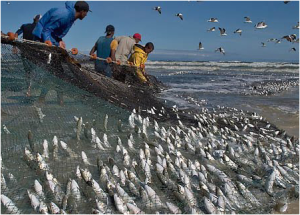The Parable of the Dragnet
Mike Johnson
 In Matthew 13, there are several parables recorded. One is the “Parable of the Net,” recorded in verses 47-50.
In Matthew 13, there are several parables recorded. One is the “Parable of the Net,” recorded in verses 47-50.
Again, the kingdom of Heaven is like a dragnet that was cast into the sea and gathered some of every kind, which, when it was full, they drew to shore; and they sat down and gathered the good into vessels, but threw the bad away. So it will be at the end of the age. The angels will come forth, separate the wicked from among the just, and cast them into the furnace of fire. There will be wailing and gnashing of teeth.
Jesus told a simple story to make clear an essential spiritual truth. He compared some men fishing with a net to the end of the world. His disciples would have been familiar with fishing and could have easily understood the story.
The Gathering
Verse 47 speaks of fishermen casting a dragnet into the sea, which gathered “fish of every kind.” Herbert Lockyer, in his book, All the Parables of the Bible, says, “The word Jesus used for net . . . implies a dragnet, a large, hauling net of great length, weighted by lead and made to sweep the bottom of the sea and gather fish in masses.” Many of the Apostles had probably fished this way.
The net would seem to represent the church, which has the responsibility of teaching God’s Word. 1 Timothy 3:15 refers to the church as the “pillar and ground of the truth.” The church is to “sound forth” the Word of the Lord (1 Thess. 1:11-12). The net gathers people from the sea — the sea represents the world.
The Separation
The parable continues by pointing out that the fishermen drew the net to the shore, putting the good fish into vessels and casting the bad fish away. Christ then says (50) that a separation between the wicked and the just will occur at the end of the world. He frequently tried to keep before the mind of people the great truth that there will be a day of judgment when the good and evil will be separated. He further emphasizes this separation of the just and unjust in Matthew 25:46, which says, “And these will go away into everlasting punishment, but the righteous into eternal life.” The fishermen put the good fish into vessels, which would be equivalent to life eternal. These would be separated from those who would go into everlasting punishment.
The parable also teaches that until Judgment Day, a mixing will exist between the wicked and the just in the church. The person doing right need not be concerned, though, as God knows His devoted followers. The Bible illustrates this concept by the situation existing at Sardis, which, according to Revelation 3:1-3, was a wicked congregation. Christ said to them (v. 1), “you have a name that you are alive, but you are dead.” Yet, in verse four, He said, “You have a few names even in Sardis who have not defiled their garments; and they shall walk with Me in white, for they are worthy.” Thus, there will be a great separation someday, but the Lord knows His own.
The parable also shows that not all church members will be saved. Some in the net (the church) will be cast away, i.e., separated from the just. The Bible does teach that a child of God can fall from grace. In I Corinthians 10:12, Paul warned the Christians at Corinth, “Therefore let him who thinks he stands take heed lest he fall.” In Revelation 3:16, Christ told the indifferent Christians at Laodicea, “So then, because you are lukewarm, and neither cold nor hot, I will vomit you out of My mouth” (Note also Gal. 5:4, 1 Cor. 9:27, 2 Pet. 1:10). Many feel that if they are members of the body of Christ, they can’t fall. This viewpoint is far from the truth. We need to take heed lest we fall, and we must make our calling and election sure.
Fate of Evil
In the last two verses, in commenting on the parable, Jesus deals exclusively with the wicked, pointing out that they will be cast into the furnace of fire in which there will be wailing and the gnashing of teeth. This imagery refers to the final abode of the wicked, which is Hell. There are different terms used in the Bible which describe Hell. It describes it as “everlasting punishment” (Mt. 25:46), “everlasting fire” (Mt. 25:41), “outer darkness” (Mt. 8:12), “everlasting destruction” (2 Thess. 1;9), and “a lake which burns with fire and brimstone” (Rev. 21:8). The Bible describes Heaven, on the other hand, as a place of joy, rest, and peace. It is undoubtedly the place where we should desire to dwell eternally.

